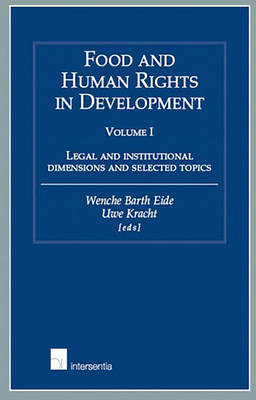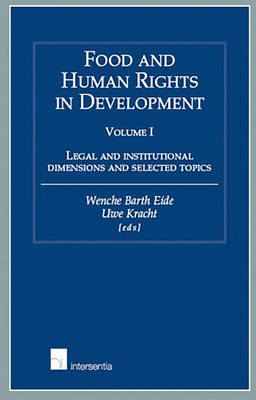
- Retrait gratuit dans votre magasin Club
- 7.000.000 titres dans notre catalogue
- Payer en toute sécurité
- Toujours un magasin près de chez vous
- Retrait gratuit dans votre magasin Club
- 7.000.0000 titres dans notre catalogue
- Payer en toute sécurité
- Toujours un magasin près de chez vous
Food and Human Rights in Development - volume I
Legal and Institutional Dimensions and Selected Topics
Wenche Barth Eide, Uwe Kracht
Livre broché | Anglais
65,95 €
+ 131 points
Description
The right to adequate food is firmly established in international human rights law. It is among those most cited in solemn declarations and most violated in practice. In a landmark decision, the 1996 World Food Summit decided to break with the all too familiar right-to-food rhetoric and requested a clarification of the content of the right to food and the fundamental right of everyone to be free from hunger and the means for its implementation. Since then much efforts have gone into further conceptualisation of social and cultural rights in general and the right to adequate food in particular. UN agencies, scholars, interested governments and civil society have joined forces in attempting to provide a foundation for national and international follow-up of the recommendations of the World Food Summit, reinforced by the Millennium Development Goals.
This first of two volumes provides evidence of some of this work and gives direction for future activities to promote and protect the right to adequate food for all. It has contributions from some 15 authors who have all been directly involved, from different angles, in the advancement of the right to food and related human rights over the past years. Besides introducing the concept of the right to food and elaborating on its theoretical basis and meaning in development, it provides several recent examples from work both at the national and international level to apply it in practical situations, and with a special view to how to go about identifying the corresponding obligations of states and complementary duties and responsibilities of non-state actors and international organisations. Finally, several chapters address the right to food under special circumstances and for special groups needing particular attention.
The book is the first of its kind on the right to food as a human right. It is not a textbook but is intended to inform and stimulate further debate among scholars, policy-makers and practitioners and activists alike, on some of the major issues of concern in applying a right-based approach to alleviating food insecurity, hunger and malnutrition, and in promoting access to and consumption of nutritionally adequate, safe and culturally acceptable food on a sustainable basis for all.
It is now evident that with the current pace of events the goal set by the WFS and the MDG of halving poverty and hunger by 2015 will not be achieved. There is a growing need to watch some of the possible effects of rapid economic globalisation and market liberalisation on food and nutrition security conditions, and to promote countervailing measures to offset their most negative consequences, particularly for vulnerable groups. The right to food is a first test case of the extent to which the application of economic, social and cultural rights can effectively exert such counterforce in an increasingly economics- and market-driven international climate, and enhance progress towards established goals
This first of two volumes provides evidence of some of this work and gives direction for future activities to promote and protect the right to adequate food for all. It has contributions from some 15 authors who have all been directly involved, from different angles, in the advancement of the right to food and related human rights over the past years. Besides introducing the concept of the right to food and elaborating on its theoretical basis and meaning in development, it provides several recent examples from work both at the national and international level to apply it in practical situations, and with a special view to how to go about identifying the corresponding obligations of states and complementary duties and responsibilities of non-state actors and international organisations. Finally, several chapters address the right to food under special circumstances and for special groups needing particular attention.
The book is the first of its kind on the right to food as a human right. It is not a textbook but is intended to inform and stimulate further debate among scholars, policy-makers and practitioners and activists alike, on some of the major issues of concern in applying a right-based approach to alleviating food insecurity, hunger and malnutrition, and in promoting access to and consumption of nutritionally adequate, safe and culturally acceptable food on a sustainable basis for all.
It is now evident that with the current pace of events the goal set by the WFS and the MDG of halving poverty and hunger by 2015 will not be achieved. There is a growing need to watch some of the possible effects of rapid economic globalisation and market liberalisation on food and nutrition security conditions, and to promote countervailing measures to offset their most negative consequences, particularly for vulnerable groups. The right to food is a first test case of the extent to which the application of economic, social and cultural rights can effectively exert such counterforce in an increasingly economics- and market-driven international climate, and enhance progress towards established goals
Spécifications
Parties prenantes
- Auteur(s) :
- Editeur:
Contenu
- Nombre de pages :
- 528
- Langue:
- Anglais
Caractéristiques
- EAN:
- 9789050953856
- Date de parution :
- 01-09-05
- Format:
- Livre broché
- Dimensions :
- 160 mm x 240 mm
- Poids :
- 920 g

Les avis
Nous publions uniquement les avis qui respectent les conditions requises. Consultez nos conditions pour les avis.






